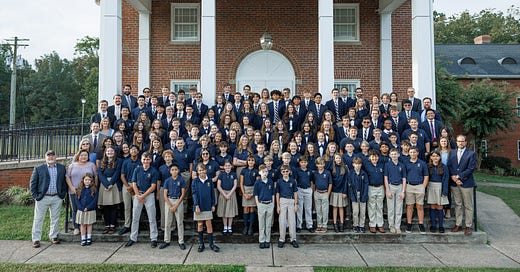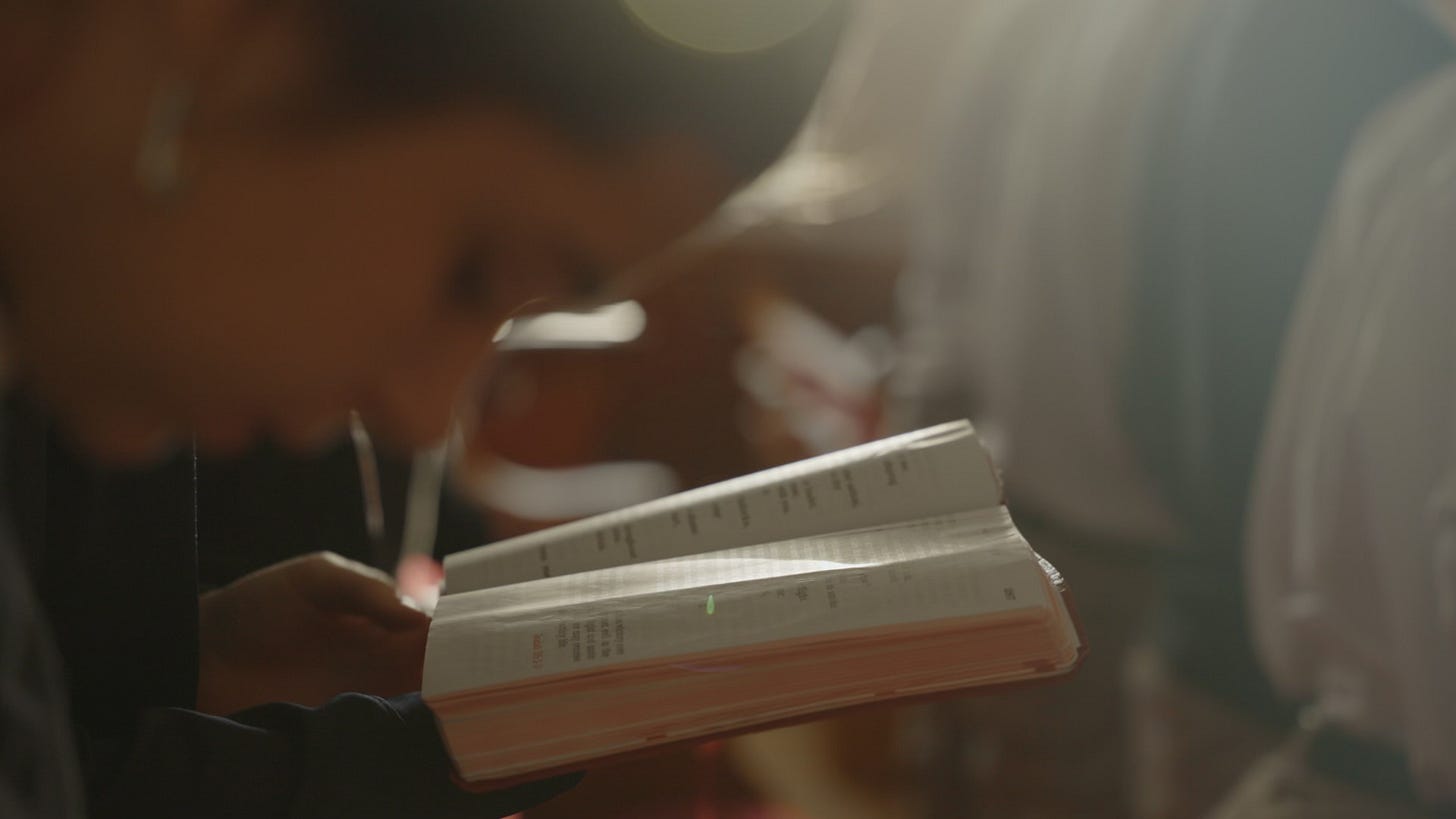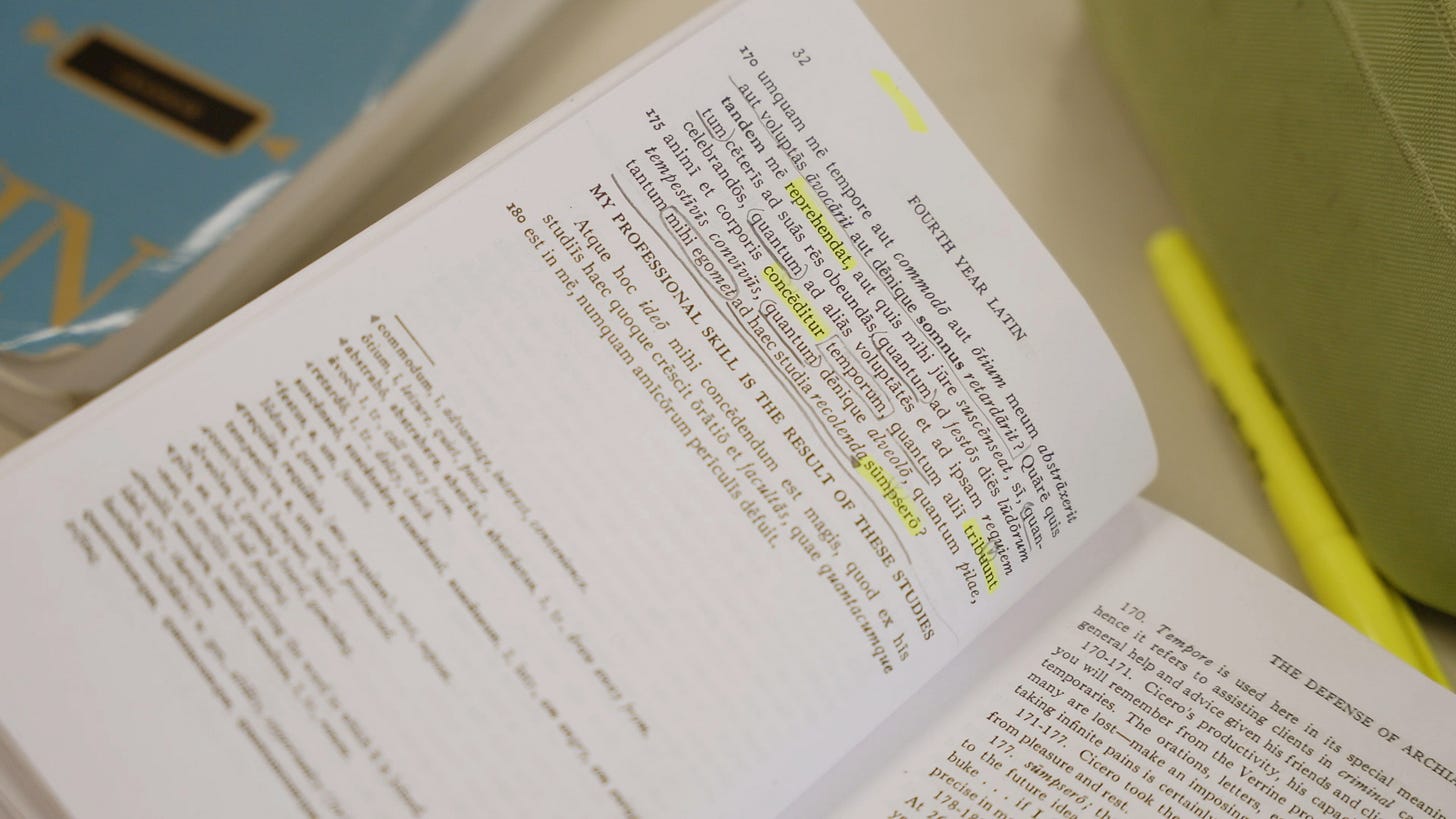Post III: Giving Tuesday...and much more!
Reflections on good stewardship, Latin instruction, and the Outdoors Program
Welcome back to A View from The Summit. The Summit Academy is a Catholic, classical, liberal-arts school in historic Fredericksburg, Va., for grades 6-12. This newsletter informs readers about the life of our school and the ways in which it plays a small part in renewing education and the Church.
You will no doubt receive emails and text messages from many organizations reminding you that today is Giving Tuesday, which was launched in 2012 to promote charitable giving through social media. On this day last year, U.S. donors contributed more than three billion dollars to charitable organizations.
Like those organizations, The Summit Academy needs charitable support. Today, a long-time supporter of The Summit is adding $250 to every gift of $50 or more towards our annual fund, which helps cover critical operating expenses. You may make a tax-deductible gift via the button below:
Revenue from paid subscriptions to this newsletter will also support The Summit Academy. Thank you in advance for considering making a contribution.
Now, for the substance…
Administrative review
Good governance, fundraising, and the spring calendar remain at the top of our administrative to-do list.
The Board of Directors is dividing into committees, which will streamline its work guiding the school’s future according to our mission: partner with parents by assisting in their vocational calling to form their sons and daughters in Christian virtue so that they become mature, responsible young adults equipped to engage the world.
The Summit’s founder and headmaster Julian Malcolm serves ex officio on the board. Eight years in, he is wisely wary of “founder’s syndrome”—the tendency in founders to resist change and strategic development. Although he is very far from that kind of person, I applaud him for working against this tendency, which can pose a threat to the long-term health of an institution. Working toward a more prosperous future for The Summit is a team effort, and its growth already has been a great reward to Christians in central Virginia.
Our fundraising efforts at the end of this calendar year will focus on tax-deductible contributions to tuition assistance. This academic year, roughly 25 percent of Summit students will receive a total of $120,120.75 in need-based assistance. Thanks to a growing group of generous donors, these dedicated students can continue to benefit from and contribute to the formation, education, and community of The Summit.
Integral to good fundraising is good stewardship. This doesn’t just mean thank-you notes, though those are important and should be heartfelt. It includes inviting donors into the life of the organization and communicating value. We are thinking through new ways to demonstrate the value of every dollar contributed to The Summit. Wise supporters aim to know where their contributions are going and how they are being used. Good philanthropy includes doing one’s best to direct support where it will be most effective.
As for the spring calendar, we’ve set dates for our big events: admissions and enrollment projects, the spring play (Shakespeare’s The Tempest), senior-thesis presentations, field day, house and grade special trips, and more. We will also schedule optional confession for students on campus during Lent along with dates for Mass, and we may host a community lecture or panel event. We plan to host two hikes per grade for the middle school, as well as outdoors activities for the upper school. These events are an extension of classroom learning, pointing in an integrated way to the ordered freedom we find in Christ. We are working towards a system where we can plan the calendar for an entire academic year well in advance.
Faculty & curriculum insight:
This week’s reflection is written by Mr. Julian Sicam. Mr. Sicam arrived at The Summit in August 2023 after having served as headmaster at a Catholic classical school in the Midwest. A graduate of Benedictine College, he now teaches Latin and Math. He is also pursuing a doctorate through the Center for Thomistic Studies at University of St. Thomas–Houston. He just passed one major test in pursuit of that degree. His reflection is below:
Why does the Church have an official language?
As a Latin teacher, I face a certain set of inquiries from students and non-students alike; it usually resembles the following: “Isn’t Latin a dead language? Why should anyone bother learning it?” A common question, indeed—though, far from impossible to answer. With a Catholic, one need only show, among a number of other things, that Latin is the official language of the Church, so it is worth learning for any Catholic. But admittedly, this is not the most satisfying answer. One of the many subsequent questions that may arise is, “Why must the Church have an official language at all?” Many things can be said in answer, but the following words will try to briefly exhibit a few worthy considerations.
Why the Catholic Church should have an official language has to do with the kind of thing the Church is, which has to do mainly with the kind of thing human beings are. Here is Aristotle on that matter in Politics, Book I, chapter 2:
Nature, as we say, makes nothing in vain, and humans are the only animals who possess reasoned speech (logos). Voice, of course, serves to indicate pleasure and pain; that is why it is also found in the other animals, because their nature is such that they can perceive what is painful and pleasant and express these to each other, and no further. But speech serves to make plain what is good and bad and so also what is just and unjust. For it is a peculiarity of humans, in contrast to the other animals, to have perception of good and bad, just and unjust, and the like; and communing in these things makes a household and a city.
Aristotle provides these words as part of an argument for why man is a political animal—which is just to say that man naturally gravitates towards being in community or society. (Perhaps another way of saying, “It is not good for man to be alone.”) The point here, however, is that for human beings, being in a community—and therefore fulfilling our nature as political animals—requires speech.
Why is this so? Well, voice (i.e. the ability to simply make noise), unlike speech, is something shared among humans and other animals. It is by voice that such animals can indicate pleasure or pain. Humans, however, are different. Unlike the other animals, in addition to experiencing pleasure and pain, we have the ability to understand the good and the bad, the just and the unjust, which cannot be signified simply by uttering noise. As St. Thomas Aquinas says in his commentary on the above passage, “speech properly belongs to men, for it is proper to them, in relation to other animals, that they have knowledge of good and evil, and thus of the unjust, and other such things, which can be signified by words.” Just as the knowledge we are capable of goes beyond that of other animals, so the way we communicate that knowledge to each other goes beyond that of other animals.
But the last part of this passage is crucial: “and communing in these things [the good and the bad, the just and the unjust] makes a household and a city.” That is to say, when we come together and form a sort of union based on these notions of the good, bad, just, and unjust, a community is formed.
May God guide our students in Latin and all their studies, so that they may joyfully contribute to the good of the Catholic Church, the highest of all goods, God Himself.
And why might we do this? Because we must. For it is the very point of words that men communicate with each other about what is good and bad. For communities are naturally ordered to the human good, meaning they naturally seek it out, and conversely, they naturally avoid evil, just as any individual human being would. But what distinguishes a community from an individual in this respect is that it seeks the human good such that it can be shared by its members.
Now, most human communities only achieve this shared good to a limited degree. But the Church was not instituted by just any humans. It was instituted by the Son of God, who knows the human good perfectly. And as it turns out, this good lies in God Himself. The Church, then, is ordered directly to this good, which is supernatural, and for this reason she transcends all other human communities, which are ordered only to natural goods.
It is fitting, then, that the Church should have her own official language. For in every community the members must come together and communicate with each other about the human good through the use of speech—by talking with each other. This activity of coming together is something inescapable for every human—it is built into our nature, just like speech. By divine institution, however, we can come together in a community based on a supernatural good, and this community we call the Church. That there is an official language of the Church, then, signifies that there is a community in which, through communicating with each other, we can seek that human good that we can only fully attain in heaven.
To be sure, the place of Latin in the Church now is a bit different than it has been in centuries past. But it nonetheless remains the Church’s official language and therefore crucial for the life of the Church. As a school in the Catholic tradition, then, The Summit Academy is doing a great service to its students by teaching them Latin because, of the many goods Latin affords, chief among them is that it allows them to be able to participate in the life of the Church more fully and completely, which is an indispensable good. May God guide our students in Latin and all their studies, so that they may joyfully contribute to the good of the Catholic Church, the highest of all goods, God Himself.
Co-curricular highlight:
In the last newsletter, I highlighted the importance of time outdoors in The Summit’s education model. Active kids tend to be happy kids, and reports suggesting that Americans are spending more time indoors than ever before serve as a good reminder to encourage students to play, move, and run outside. This activity mirrors classroom learning. Being taught that learning is an adventure equips students to embrace challenges with a sense of hopefulness and courage.
Nature provides at least two other goods: it challenges our comfort zones and offers an encounter with the beauty of creation and the providence of God. These concepts undergird our Outdoors Program, which has been an integral part of The Summit since its founding. Summit students are encouraged to challenge themselves in local hikes, kayaking, biking, and more, while also leaving room for individual differences in students’ interests and abilities. There are few better ways to appreciate creation and God’s providence than encountering the beauty of the outdoors. As Pope John Paul II observed:
The aesthetic value of creation cannot be overlooked. Our very contact with nature has a deep restorative power; contemplation of its magnificence imparts peace and serenity. The Bible speaks again and again of the goodness and beauty of creation, which is called to glorify God.
This spring, the annual senior retreat will take the senior class and several alumni from the Class of 2022 to Moab, Utah. They will camp, backpack, kayak, and rock climb. They will be guided by COR Expeditions, an initiative of Wyoming Catholic College, which is aligned with The Summit’s mission and was founded in 2016 to share transformational encounters with Christ through backcountry experiences and outdoor education.
At The Summit, we’ll continue to encourage students to take on new adventures, knowing that, as the late Pope Benedict XVI wrote, we were made not for comfort but for greatness.
What we’re reading:
When I asked a tenth-grader last week what was bringing him joy, he responded, “Well, we’re reading Jane Austen, and I’m really liking that.” This hallway conversation inspired me to try, once again, reading Jane Austen. I’m two-thirds of the way through Pride and Prejudice, and it’s really quite good. Her writing is witty, insightful, and beautiful. Attentive encounters with this material will equip our students to be good writers, creative thinkers, and most important, virtuous men and women.
Last post, I mentioned that I had received Andrew Youngblood’s new book Know Thyself: Classical Catholic Education and The Discovery of Self. Many publications on the topic today focus on a given author’s favored social, cultural, or political outcomes as the primary end of renewed classical education. By contrast, this work is a terrific contemporary introduction to the timeless foundation, method, and purpose of Catholic education—and why the classics are essential in this equation. Through knowledge of ourselves and others, we can better know and serve God. This is worthwhile reading for educators and parents alike.
Finally, Advent is nearly upon us. Don’t forget to prepare! Consider how God is asking you to spend time with Him this Advent in anticipation of the birth of Jesus. One good resource is Joseph Ratzinger’s book Jesus of Nazareth: The Infancy Narratives. As a result of reading this book, which explains the historical context of Christ’s birth and offers related meditations, I developed a strong sense of the truly human, truly historical nature of the Incarnation.
If you are enjoying this newsletter, please consider subscribing via the button above and sending it along to others who might be interested. Revenue from paid subscriptions will support The Summit Academy of Central Virginia.







